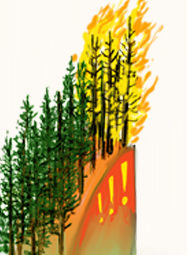Mycobiont contribution to tundra plant acquisition of permafrost-derived nitrogen
As Arctic soils warm, thawed permafrost releases nitrogen (N) that could stimulate plant productivity and thus offset soil carbon losses from tundra ecosystems. Although mycorrhizal fungi could facilitate plant access to permafrost-derived N, their exploration capacity beyond host plant root systems into deep, cold active layer soils adjacent to the […]

